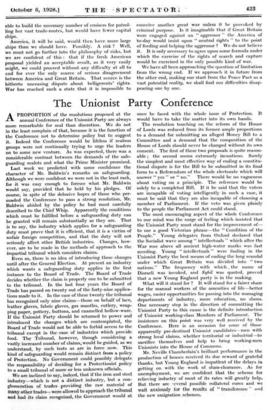The Unionist Party Conference
APROPORTION of the resolutions proposed at the annual Conference of the Unionist Party are always more remarkable for zeal than discretion. We do not in the least complain of that, because it is the function of the Conference not to determine policy but to suggest it. Indeed the Conference would be lifeless if zealous groups were not continually trying to urge the leaders on to some new venture. As was expected, there was a considerable contrast between the demands of the safe- guarding zealots and what the Prime Minister promised.
Last week we predicted with some confidence the character of Mr. Baldwin's remarks on safeguarding. Although we were confident we were not in the least rash, for it was easy enough to foresee what Mr. Baldwin would say, provided that he held by his pledges. Of course, in spite of the delusive hopes of those who per- suaded the Conference to pass a strong resolution, Mr. Baldwin abided by the policy he had most carefully described to the Chief Whip. Apparently the conditions which must be fulfilled before a safeguarding duty can be granted will remain substantially as they are. That is to say, the industry which applies for a safeguarding duty must prove that it is efficient, that it is a victim of unfair foreign competition, and that the duty will not seriously affect other British industries. Changes, how- ever, are to be made in the methods of approach to the impartial tribunal which considers claims.
Even so, there is no idea of introducing these changes until after the General Election. At present an industry which wants a safeguarding duty applies in the first instance to the Board of Trade. The Board of Trade decides whether the claim is properly one to be submitted to the tribunal. In the last four years the Board of Trade has passed on twenty out of the forty-nine applica- tions made to it. In the case of these twenty the tribunal has recognized only nine claims—those on behalf of lace, leather gloves, fabric gloves, gas mantles, cutlery, wrap- ping paper, pottery; buttons, and enamelled hollow-ware. If the Unionist Party should be returned to power and introduced the changes which are contemplated, the Board of Trade would not be able to forbid access to• the tribunal except in the, case of industries which provide food. The Tribunal, however, though considering a vastly increased number of claims, would be guided, as we understand, by such tests as are in force now, This kind of safeguarding would remain distinct from a policy, of Protection. No Government could possibly delegate the responsibility of deciding for a Protectionist .policy to a small- tribunal of more or less unknown officials..
We are inclined to say, indeed, that if the iron and steel industry—which is not a distinct industry, but a con- glomeration of trades -providing the raw- material of many other trades—were allowed to approach the tribunal and had its- claim recognized, the Government would at. once be faced with the whole issue of Protection. It would have to take the matter into its own hands.
The resolution touching on the reform of the House of Lords was reduced from its former ample proportions to a demand for submitting an alleged Money Bill to a Committee and a demand that the composition of the House of Lords should never be changed without its own consent. The first of these two proposals is quite reason- able ; the second seems extremely incautious. Surely the simplest and most effective way of ending a constitu- tional dispute is for the Bill to be submitted in its final form to a Referendum of the whole electorate which will answer " yes " or " no." There would be no vagueness about voting on a principle. The reference would be solely to a completed Bill. If it be said that the voters are incapable of voting intelligently in such a case, it must be said that they are also incapable of choosing a member of Parliament. If the veto was given plainly to the people the Parliament Act could stand.
The most encouraging aspect of the whole Conference to our mind was the surge of feeling which insisted that the Unionist Party must stand for the improvement of— to use a good Victorian phrase—the " Condition of the People." Young delegates from Oxford declared that the Socialist wave among " intellectuals " which after the War rose above all ancient high-water marks was fast receding. Young " intellectuals " were finding in the Unionist Party the best means of ending the long scandal under which Great Britain was divided into " two nations." The frequency with which . the name of Disraeli was invoked, and Sybil was quoted, proved that a new Young England party is in the making.
What will it stand for ? It will stand for a fairer share for the manual workers of the amenities of life—better wages, easier opportunities for passing into the managing departments of industry, more education, no slums. One necessary step in the direction of committing the Unionist Party to this cause is the definite introduction of Unionist working-class Members of Parliament. The insistence on this point was very well received by the Conference. Here is an occasion for some of those apparently pre-destined Unionist candidates—men with strong local claims, whether territorial or industrial—to sacrifice themselves and help to bring working-men Unionists into the House of Commons.
Mr. Neville Chamberlain's brilliant performance in the production of houses received its due reward of grateful thanks, but Young England is impatient of the delays in getting on ._ with the work of. slum-clearance. _ As for unemployment,. we are confident that the scheme for relieving industry of most of its rates will • greatly help. But there are nveral possible collateral cures and we wait anxiously for the results of transferenee " and the new emigration schemes.






















































 Previous page
Previous page